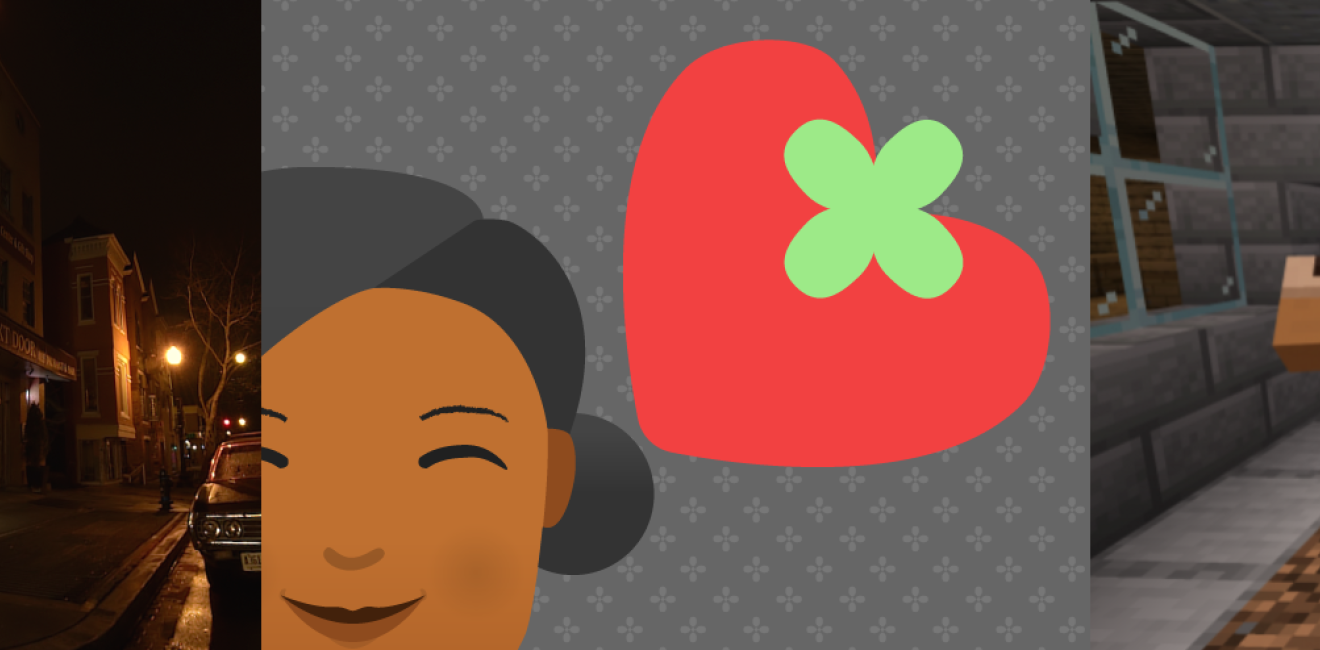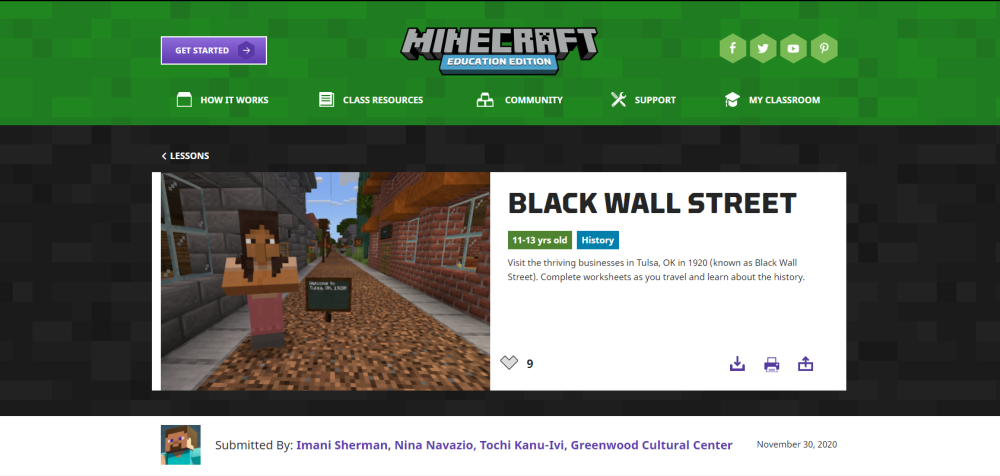Games Round Up: Black History Month 2021
An overview of digital games and VR experience that bring Black history and the contemporary experience to life.

A blog of the Science and Technology Innovation Program
An overview of digital games and VR experience that bring Black history and the contemporary experience to life.

February is Black History Month, a month with roots back to 1925 when Carter G. Woodson cemented efforts to raise awareness and celebrate the contributions of Black Americans to both U.S. and world history. It is a month where educators, parents, and government institutions join to amplify both the collective history as well as specific role models within each field.
Science and technology fields in particular need to look for ways to celebrate diversity; the field of games and game studies is just one avenue. There are many conversations occurring within the broader games field, from problematic representation of Black characters in games to 2% representation in those who make games*. There is also work which underscores the broader contributions of Black voices to the history of video games, and uses games as an educational tool for Black history and confronting racial bias. While we highlighted some of these titles a few years ago, there are several digital products developed since then which were not included in the original list. At the end of this overview, additional resources and research are provided to allow the conversation to continue beyond the month of February.
CONTENT WARNING: This post contains references to digital experiences that depict forms of racism and discrimination, and some may contain violence or strong language. There are no explicit descriptions or graphic depictions in the text below, however, the games themselves may have sensitive content.
(Free; VR, HTC Vive/Vive Pro recommended; Trigger warning on website)
Associate Professor Courtney Cogburn, PhD, collaborated with Professor Jeremy Bailenson, PhD, and the Virtual Human Interaction Lab at Stanford University to create the virtual reality (VR) experience of 1,000 Cut Journey. Funded by the Brown Institute for Media Innovation at Columbia University, the simulation challenges participants to experience racism through the life of a Black man, Michael Sterling: from child in the classroom experiencing disciplinary action, to an adolescent in an encounter with the police, to workplace discrimination. The player is not just asked to explore, but also asked to embody (such as sitting, kneeling) the actions of Michael Sterling. “The idea of a 1,000 Cut Journey is this notion that there are small and big things that happen all the time in a given life that create damage, that can have a negative impact on one’s well-being, one’s health… and so we sought to create an experience that would represent at least just a sliver of what that is from the perspective of a black male….” Cogburn said in an interview with NBC News, adding, “I wanted people to be able to walk in someone else’s shoes.”
One specific interest in virtual reality from an educational perspective is the potential for empathy--the capacity to put users into the story of a marginalized group. Studies derived from 1,000 Cut Journey support this potential; in one sample, 85.5% of users indicated that the experience enhanced their empathy for racial minorities.
(Free; VR, Oculus/YouTube)
Traveling While Black is a VR documentary experience directed by Roger Ross Williams, who also directed the Academy Award-winning short documentary film Music for Prudence. This project, itself nominated for an Emmy and an Oscar, chronicles the travels of a Black family through the American South, using The Negro Motorist Green Book as their guide to safe restaurants and hotels. It follows the journey to Ben’s Chili Bowl, a historic Washington, D.C. landmark with deep ties to the Civil Rights movement. The user finds themselves throughout most of the experience listening to immersive interviews that unfold the story of the Green Book era. This film was part of The New York Times Op-Docs work, which wrote, “This film offers a revealing view of the Green Book era as told through Ben’s Chili Bowl, a black-owned restaurant in Washington, and reminds us that the humiliations heaped upon African-Americans during that time period.” Comparing it to the 2018 movie Green Book, Williams called Traveling While Black "...a story of life or death, and danger, and community, and all of those things. But it’s our story. It’s for us to tell. It’s not for anyone else."
(Free, VR, Oculus and Youtube 360)
Created by Associate Professor and Department Head Derek Ham, Assistant Professor of Graphic Design at North Carolina State’s College of Design, I Am A Man is a virtual reality experience created in 2018 that transports players back to 1968 and the Civil Rights movement. Using historical photographs and film, narration from Civil Rights participants, and a virtually constructed environment, players are put in the middle of the Memphis Sanitation Worker’s Strike and events leading to the assassination of Dr. Martin Luther King, Jr. The title of the piece derives directly from the iconic signs used in the Strike. The game has won awards from the Cleveland International Film Festival, the Nashville Film Festival, the Capital City Film Festival, and the People’s Film Festival. The project received some support from Oculus as a Winner of a 2017 Scholarship from the Oculus Rift Launchpad Program.
(Free; VR/YouTube)
Greenwood Avenue is a virtual reality experience created by Ayana Baraka and directed by Talibah L. Newman, wherein the player follows a fictional 14-year-old Black girl, Agnes, coming-of-age in Tulsa, Oklahoma’s Black Wall Street in the 1920s. This perspective is used to present the tragedy of the Tulsa Race Massacre of 1921, which saw over three-hundred Black men, women, and children killed and their homes and businesses burned by thousands of white supremacists. The Greenwood Cultural Center in Tulsa, Oklahoma provided the development team with a filming location, and the VR experience includes a mix of live reenactments, historical documentation, and sources such as an interview with Dr. Olivia J. Hooker, the last known survivor of the Tulsa Race Massacre. Some of the actors in Greenwood Avenue VR are direct descendants of those who experienced the Tulsa Race Massacre. Spanning five episodes of about five minutes each, Greenwood Avenue is made to be played on mobile devices, Google Cardboard, or any other VR system compatible with YouTube. Players should be aware that violence and strong language are depicted.
(Free, PC and Mac Desktop & Online)
Fair Play is a digital roleplaying game produced by The LEAD Center at the Wisconsin Center for Education Research at UW-Madison as an outreach mechanism for ongoing research into bias in academia, specifically science, technology, engineering, mathematics and medicine (STEMM) fields. Players can walk a virtual mile in the shoes of Jamal Davis, a Black graduate student, and experience racial bias that not only derives from individual perceptions but institutional cultural practices. One of the key takeaways this game presents is the range of forms bias can take, such as microaggressions, with the goal of building awareness. Yet the game also forces the player to navigate bias, thus forcing the player to consider what can be done on both a day-to-day basis as well as at the institutional level. The game can be played stand alone, but was originally designed as part of a hands-on exercise as part of a workshop series produced by The LEAD Center. As an elicitation tool, the game allows for clear examples in bias training, with research suggesting this can help deepen participant learning. Funding from the University of Wisconsin System Administration and National Institutes of Health supported Fair Play and its complementary workshops.

(Free, Requires Minecraft Education)
Designed by Imani Sherman, Nina Navazio, Tochi Kanu-Ivi, Dr. Libby Dawson, Mechelle Brown, Greenwood Cultural Center and their board of directors, the Black Wall Street module for Minecraft Education Edition is a complete lesson plan designed that immerses students in the history of 1920's Tulsa, Oklahoma and the businesses known as Black Wall Street. Minecraft Education Edition is the educational version of the popular game, Minecraft, that was designed specifically for the classroom. This module includes lesson plans, identifies key vocabulary, and brings front and center reflections on community, leadership, and allyship. The game module is in turn linked to documentaries and interviews provided by the Greenwood Cultural Center.
(Free, Browser)
SweetXheart, by Catt Small, asks a very straightforward question: can you get through a week in the life of a modern Black woman? The game puts the player in the role of Kara, a 19-year old Black woman living in Bronx, trying to navigate a week of her life, which includes balancing school, work, and classes--and catcalling, bias, and confronting stereotypes. The cute visuals belie the challenging quandaries that arise throughout the day. Every choice matters, whether that is about the clothes Kara wears, cooking with her mother or going to study or going out with her friends, to handling demeaning boss interactions. These choices not only influence the shape of the story, but also impact Kara’s stress levels--a tool used to also highlight the impact of microaggressions on Kara. Beyond the visuals and mechanics, one of the appeals of this game might be that it is short, opening up avenues for replayability.
*In a recent International Game Developers Association (IGDA)’s Developer Satisfaction Survey (DSS)s, which surveys (among other things) demographic information of a 1,000+ sample of those in the video game industry, 2% of respondents were Black.
This post is intended for educational purposes only. This is a sample of the field and not a comprehensive list. We have not vetted all of these experiences and games, but have in some cases relied on reviews and publications surrounding them. Being included on this list is not an act of endorsement by the Wilson Center, Science and Technology Innovation Program, or Serious Games Initiative. Did we miss a game? Email us at games@wilsoncenter.org




The Serious Games Initiative communicates science and policy complexities through the world’s most dynamic medium: gaming. Read more


The Science and Technology Innovation Program (STIP) serves as the bridge between technologists, policymakers, industry, and global stakeholders. Read more
